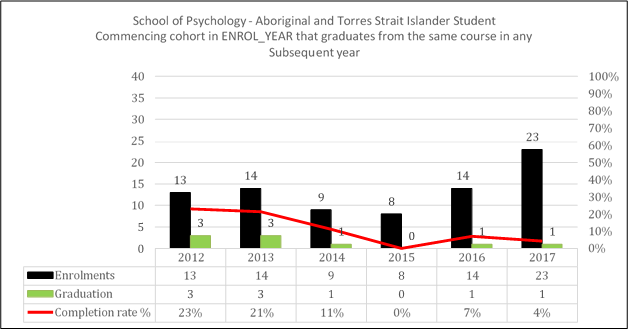Completions (outcomes)
3.Completions (outcomes)
3.1 Rise and fall of completions
3.1.1 Outcomes
The completions of Indigenous students at UNE has been stable in 2017 and 2018 with 74 reportable completions recorded for both years (Table 21). This number of reportable completions differs somewhat from the record number of Indigenous graduands (i.e. 99; See Section 2.2.5) who participated in the three graduation ceremonies held at UNE in 2018. This is attributable to the lag in the ‘report year’ for completions versus graduation reports per calendar year (see Note in Table 20). Nevertheless, if graduations per calendar year are trending upwards it is expected that reportable completions will follow this trend upwards in 2019.
Table 21: Course Completions by Indigenous students at UNE 2014-2018 (by calendar year)
| Number of Student Completions | 2014 | 2015 | 2016 | 2017 | 2018 |
|---|---|---|---|---|---|
| Indigenous Graduates | 64 | 48 | 55 | 74 | 74 |
| Non-Indigenous Graduates | 3643 | 3519 | 3271 | 3565 | 3556 |
a.'report year’ is the final year in which the student studied. The course completion is reported to HEIMS in the following calendar year. This data includes course completions from 1 April of the report
Source: ‘Graduations’ Excel Worksheet dated 09/04/2019 prepared by UNE Business Intelligence Unit
Data Trend Note
Data from the School of Psychology as shown in Figure 9 below indicates that commencing student enrolments have continued to rise since 2015. As the time line from course enrolment to completion ranges from three to six years, it is anticipated that the 2014, 2015 and 2016 completion rates will continue to steadily improve as students progressively graduate. It is also anticipated that there will be a higher absolute number of graduate completions given growth in the cohort.
 Source: UNE School of Psychology
Source: UNE School of Psychology
Figure 9: School of Psychology commencing cohort and subsequent year graduation trends 2012-2017.
3.1.2 Strategies connecting graduates with employment (both within and outside the institution)
Across the University, a number of opportunities are available to Indigenous students to enable them to make workforce connections and improve their employment prospects upon graduation. These include:
- The Senior Human Resources Consultant, Aboriginal Employment at UNE continues to promote the Aboriginal Casual Employment Register to UNE recruiters as well as to Aboriginal Torres Strait Islander students and graduates.
- All graduates from the Joint Medical Program are employed by the State Health Departments to commence internship – as required to gain full registration.
- The School of Health is a member of the Congress of Aboriginal and Torres Strait Nurses and Midwives (CATSINaM) which is the peak body that represents Aboriginal and Torres Strait Islander nurses and midwives across Australia. The aim of this body is to increase the recruitment and retention of Aboriginal peoples into nursing and midwifery roles across Australia. Sponsorships to attend the conference were arranged for four Indigenous students enrolled in nursing degrees at UNE in 2018.
- The School of Health also supports Aboriginal and Torres Strait Islander nursing students gain continuing employment via support/promotion of Cadetships available with NSW Health.
- Programs in the School of Education, the School of Health and the School of Rural Medicine require student placement in work/clinical settings for course completions. Indigenous students who participate in placements are supported by the Oorala Aboriginal Centre to apply for ‘Away from Base’ funding through Abstudy to assist students meet the accommodation costs of these placements.
- The UNE Careers Team facilitates the Unit of Study titled Work300 Integrated Learning –Professional Skills Development. This unit is an elective available across a range of Courses at UNE. It is designed to enables students to apply their academic knowledge in a workplace context, and to reflect and report on the experience, thus increasing their level of career readiness. The work includes: (1) 120 hours of fully supervised professional activity, project work or directed investigation in a host workplace; (2) not more than 30 hours of additional study and assignment preparation including the Online Preparation Moodle unit.
- UNE has supported students to achieve Internships via the Career Trackers Indigenous Internship Program in 2018 Indigenous students studying, Law, Business and Science participated in internships with external recruiters including the NSW Environmental Protection Agency.

